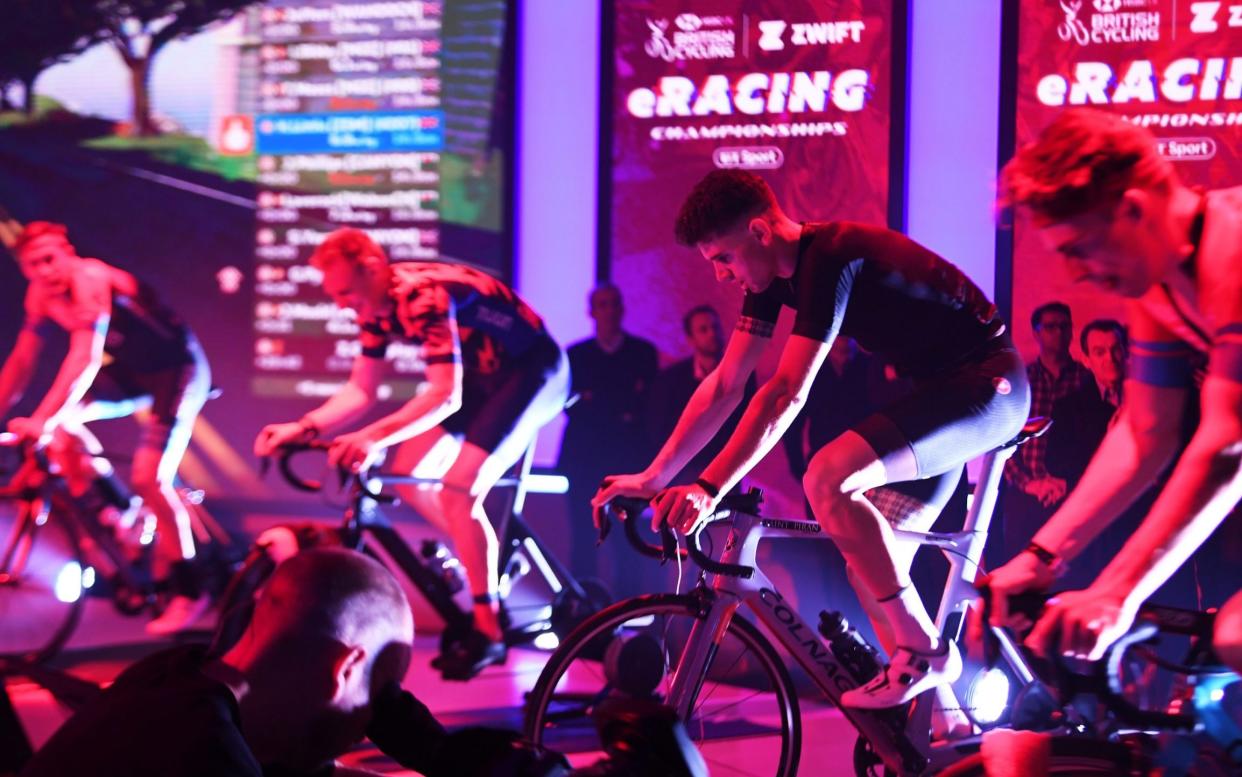'Digital doping' row in cycling world, as online racing sparks new cheating phenomenon

Even before the Covid pandemic kept us all indoors, virtual cycling had seen a boom in popularity during the cold winter months.
But just as in the real thing, the spectre of cheating is threatening to ruin the sport. Welcome to the world of ‘digital doping’.
Amateur cyclists looking to gain an edge on competitors have been warned by Zwift, one of the largest online platforms that boasts of having Tour de France winner Geraint Thomas (below) as brand ambassador, they will be suspended if they try to cheat the system.

Racers take part by removing their rear wheel and attaching the rear axle of their road bike to a turbo trainer, which sends performance data to their computer or mobile phone via a WiFi or Bluetooth connection. Their cyclist then races on screen as an “avatar”.
But a number of riders have resorted to inflating the amount of power they record by deliberately miscalibrating their bike’s power meters. This produces an artificially high power number, allowing their ‘virtual’ self to record a faster ride. Others are suspected of editing the power data they record during an event to present a better performance.
Such is the scale of concern that the company has set up its own equivalent of professional sport’s anti-doping regulator Wada.
Zwift Accuracy and Data Analysis (Zada) monitors all rides for suspicious results, and subjects the top three finishers in each race, along with two randomly selected riders, to forensic data analysis. The company has already suspended a number of athletes caught cheating during their elite events.
“Unfortunately given human nature around competitive events there are always people looking for an unfair edge over others,” Chris Snook, Zwift’s head of PR, told The Telegraph.
“Even with community events, where the stakes are lower it’s important for us to police this because it risks ruining it for everyone.”
Zwift’s racing platform has grown in popularity with elite athletes, including the likes of 2018 champion Thomas, competing in stages of its Virtual Tour de France. The Zwift Academy even nurtures emerging talent via its online training platform, allowing them to be spotted by real-life professional teams.
In 2019 New Zealander Ella Harris joined leading women’s pro cycling team Canyon-SRAM team this way, with other academy graduates going on to secure professional wins last year.
Prize money for these virtual races runs into the thousands and with real life teams entering esports events commercial sponsorship and national and world championship titles are at stake.
In December the UCI held the first-ever esports world championships on Zwift, with a first prize of 8,000 Euros, featuring famous pros such as Victor Campenaerts and Rigoberto Urán.
Zwift recently found such discrepancies in the data of two professional cyclists, Antonina Reznikov, from Israel and Selma Trommer, from Germany, and suspended them from entering competitive races.
Reznikov admitted to changing the power data of her file, but later said she instead deleted her warm-up data.
Trommer insisted her files were edited accidentally. Their cases followed that of British triathlete and cyclist Lizi Duncombe (pictured below), who was last November barred for six months for “fabrication or modification of data” and “bringing the sport into disrepute”.

Duncombe, from Berkhamsted, Herts, has denied cheating, saying in a statement on Facebook that her bike computer ran out of battery during the race, which meant she could not find a complete race file to upload.
“I had a file that looked like the warm-up, and it was the only thing I could find, so I sent it. In hindsight, I should have just stopped after sending the original file which only contained a small section of recording and taken the single race DQ [disqualification] if that was going to be the outcome,” she wrote.
“But in an attempt to work with Zada and provide them with what they needed I actually made the whole situation worse. I have never tried to maliciously tamper with my data and have always been a transparent athlete.”
She told The Telegraph: "Virtual racing is still a very young sport and like all new sports there are going to be teething issues, but I fully support Zwift in their mission of promoting fair racing and remain in regular contact with the Zwift cycling esports commission to find the best forward for myself as an athlete racing on Zwift. I’m lucky enough for that to have been acknowledged and I’ve been invited to race again for a team in March and I’m really looking forward to it."
In 2019 British Cycling stripped Cam Jeffers of his Cycling eRacing Championship title and barred him from all races, real and virtual, for six months, after he was found to have manipulated pre-race data to gain an unfair advantage.

“As we’ve seen Zwift racing is growing in popularity at professional level and with prize money and sponsorship there is an incentive for people to cheat,” said Mr Snook. But cheating is not limited to professional riders, with a number of Zwift’s community users found to be lying about their weight in order to alter their power output readings.
By registering themselves as lighter than they really are they increase their ‘watts per kilo’ power measurement, making their virtual selves faster. It is something that infuriates other Zwift users.
Simon Bromley, a cyclist and cycling writer from Bristol, posted on Twitter:
This is both funny & tragic. Maybe I'm just not competitive enough, but the idea of cheating to win virtual races is so sad.
Zwift transparency and the role of dual recording during racing https://t.co/IRZou4J7r3— Simon Bromley (@simonbromley) January 29, 2021
Brian Cooper, from Manchester, added: “Do not get me started on the weight cheating . . . all over Zwift - winds me right up.”
With an average of 780 races held on Zwift each week around the world, the platform uses automatic computer detection to flag up performances that are physically impossible for riders of their standard and abilities. Fellow riders can also flag others they suspect of cheating.
These are subject to appeal, but can result in the rider being subject to a ‘shadow ban’, by which they can still use the platform but won't be seen by other users.
“It’s important for us to prevent cheating as much as possible, for the sake of everyone else’s enjoyment,” said Mr Snook.
“For most it's just a fun activity, but it still matters when others try to gain an unfair advantage.”

